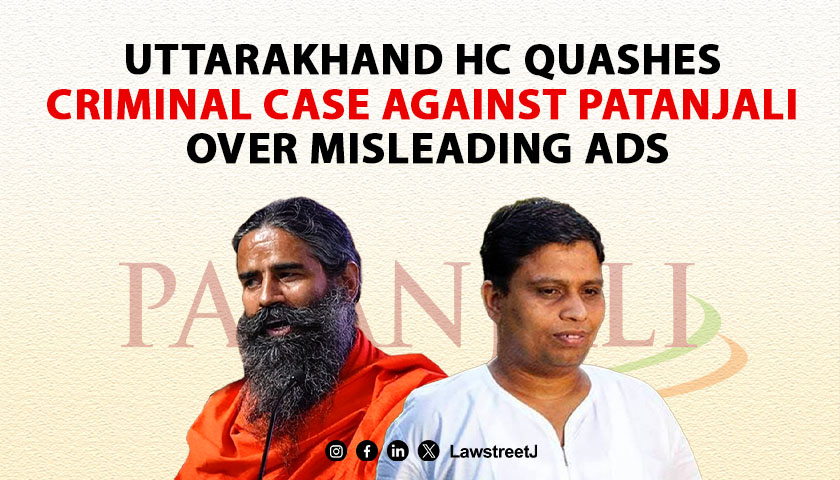Uttarakhand: The Uttarakhand High Court has delivered a significant judgment quashing criminal proceedings against Patanjali Ayurved Ltd and its founders over alleged misleading medical advertisements, emphasizing procedural lapses and concerns regarding fundamental rights.
Justice Vivek Bharti Sharma made crucial observations on the procedural requirements for prosecuting cases under the Drugs and Magical Remedies (Objectionable Advertisements) Act, 1954.
The court addressed Criminal Misc. Application No. 118 of 2025, filed by M/s Patanjali Ayurved Ltd. and others, seeking to set aside the summoning order dated 16.04.2024 and quash proceedings in Criminal Case No. 3892 of 2024. The court noted, “This criminal misc. application is filed by the petitioners/accused under Section 528 of the B.N.S.S. for setting aside the summoning order dated 16.04.2024 and to quash the proceedings.”
Addressing the specific concerns about the complaint filed by the State, the court observed, “The complaint case was filed by the State to summon, try, and punish the petitioners/accused for the offence punishable under Sections 3 & 4 of the 1954 Act, read with Rule 6 thereof, based on letters from the Ayush Mantralaya regarding allegedly misleading advertisements for medicines like Madhugrit, Madhunashini, Divya Lipidom Tablet, and others.”
The court highlighted significant procedural and legal deficiencies in the case, stating, “There is no allegation in the Complaint Case as to how and what was false in the alleged advertisement. Rather, there is no allegation or averment at all that the alleged advertisements were false.”
In a critical observation about the cognizance order, the court stated, “In the impugned order dated 16.04.2024, there is not even a single observation that may reflect the application of judicial mind by the trial court while taking cognizance and summoning the accused persons.”
The court emphasized several key legal principles, including the limitation period for taking cognizance, noting that “most of the offences were allegedly committed by the petitioners prior to 15.04.2023, that is, more than one year before the date when cognizance was taken.”
Regarding the vicarious liability of directors, the court referenced the Supreme Court’s judgment in Sunil Bharti Mittal vs. Central Bureau of Investigation, stating that “when the company is the offender, vicarious liability of the Directors cannot be imputed automatically, in the absence of any statutory provision to this effect.”
The court also addressed the fundamental right to carry on trade and business, observing, “It is an inalienable fundamental right of every Indian citizen to carry on any occupation, trade, or business under Article 19(1) of the Constitution of India, subject to reasonable restrictions imposed under the law.”
In its final directive, the court stated, “The impugned cognizance and summoning order dated 16.04.2024 passed by the learned Chief Judicial Magistrate, Haridwar, in Criminal Complaint Case No. 3892 of 2024 against the petitioners for the offence punishable under Sections 3, 4 & 7 of the ‘1954 Act’ is hereby set aside.”
The court further emphasized that the sine qua non for taking cognizance is the application of judicial mind by the Magistrate, and that a person ought not to be dragged into court merely because a complaint has been filed.
Mr. Piyush Garg appeared as counsel for the petitioners, while Mr. Deepak Bisht, the learned Deputy Advocate General, appeared for the State of Uttarakhand.
Case Title: M/s Patanjali Ayurved Ltd. & Others vs. State of Uttarakhand






![Relocation of Uttarakhand HC outside Nainital: SC stays HC's order [Read Judgment]](/secure/uploads/2024/05/lj_5859_3966274a-4508-4c77-88bb-74263432a8aa.webp)




